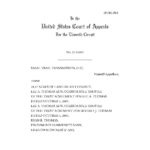 On February 3rd, the Eleventh Circuit Court of Appeals issued its decision in favor of the property owners – the Thomas family – in Sabal Trail Transmission, LLC v. 18.27 Acres of Land in Levy County, et al. (Sabal Trail v. Thomas Family). The court’s ruling was a total win for the landowners and will help landowners in natural gas pipeline cases in Florida and across the country.
On February 3rd, the Eleventh Circuit Court of Appeals issued its decision in favor of the property owners – the Thomas family – in Sabal Trail Transmission, LLC v. 18.27 Acres of Land in Levy County, et al. (Sabal Trail v. Thomas Family). The court’s ruling was a total win for the landowners and will help landowners in natural gas pipeline cases in Florida and across the country.
Most landowners, when confronted with the prospect of fighting a huge company in court for years, are forced to accept whatever payment the company decides to offer. The Thomas family has endured years of litigation against the pipeline company and, in the end, the pipeline company lost at trial, and the jury returned a verdict in favor of the Thomas family. The Thomas family owned a watermelon and peanut farm through which Sabal Trail wanted to build an interstate natural gas pipeline. The pipeline company only offered to pay the Thomas family a fraction of the value of the property that a jury later determined the Thomas family’s property was worth. The appeals court previously ruled that the Thomas family was, in fact, fully entitled to compensation from the pipeline company that the jury awarded.
This is the second appeal the landowners have won in this case. In this second appeal, the pipeline company challenged Florida’s substantive state-law guarantee that private landowners whose property is condemned for a pipeline must be made whole – including interest, attorneys’ fees, and litigation expenses. The pipeline company argued that it shouldn’t be required to pay landowners’ attorneys’ fees when it condemns their land and forces the landowners into court. The pipeline company asked the Eleventh Circuit to break with the Eleventh Circuit’s own precedent and rule contrary to the Third and Sixth Circuits.
Aware that it was issuing its decision on the day after Groundhog Day, the court colorfully illustrated why the landowners should prevail under its prior precedent. The court explained that if it refused to do so, “every sitting of this court would be a series of do-overs, the judicial equivalent of the movie ‘Groundhog Day.’ While endlessly recurring fresh starts is an entertaining premise for a romantic comedy, it would not be a good way to run a multi-member court that sits in panels. We therefore put Punxsutawney Phil aside and adhere to the prior-precedent rule.”
Florida’s state constitution guarantees private landowners that, if their property is condemned through eminent domain, the condemning authority must pay the owner the “full” measure of compensation, which includes reimbursing the owner’s attorneys’ fees and litigation expenses and interest for the delay in paying the owner. The pipeline company argued it need only pay nominal interest and needn’t reimburse any of the Thomas family’s legal fees and litigation expenses. The pipeline company said this was so because the federal law “displaced” Florida’s state law property rights with a new and different “federal common law” that did not require the pipeline company to make the Thomas family whole and did not require the pipeline company to reimburse the Thomas family’s attorney fees and interest as provided under Florida law.
Sabal Trail v. Thomas Family involves issues of constitutional law that sweep even more broadly than the Natural Gas Act. Sabal Trail’s argument that it can take private property and not pay the owner the full measure of compensation Florida law requires raises significant constitutional issues concerning the measure of compensation when the congressional act authorizing a private licensee to use eminent domain is silent as to whether federal or state law supplies the “rule of decision.” The specific question the Eleventh Circuit considered in Sabal Trail v. Thomas Family was whether, when a private for-profit pipeline company is granted a license by a federal agency allowing the pipeline to take an owner’s land, must the pipeline company pay the owner the “full measure” of compensation for the owner’s property as the owner’s property is defined by state law, or whether some federal common law has displaced the state’s substantive law defining an owner’s property. Practically speaking, unless the measure of compensation included payment of the owner’s attorneys’ fees and costs, there would be no way the Thomas family, or any other small landowner, would be able to stand-up against a billion-dollar private licensee energy company such as Sabal Trail.

